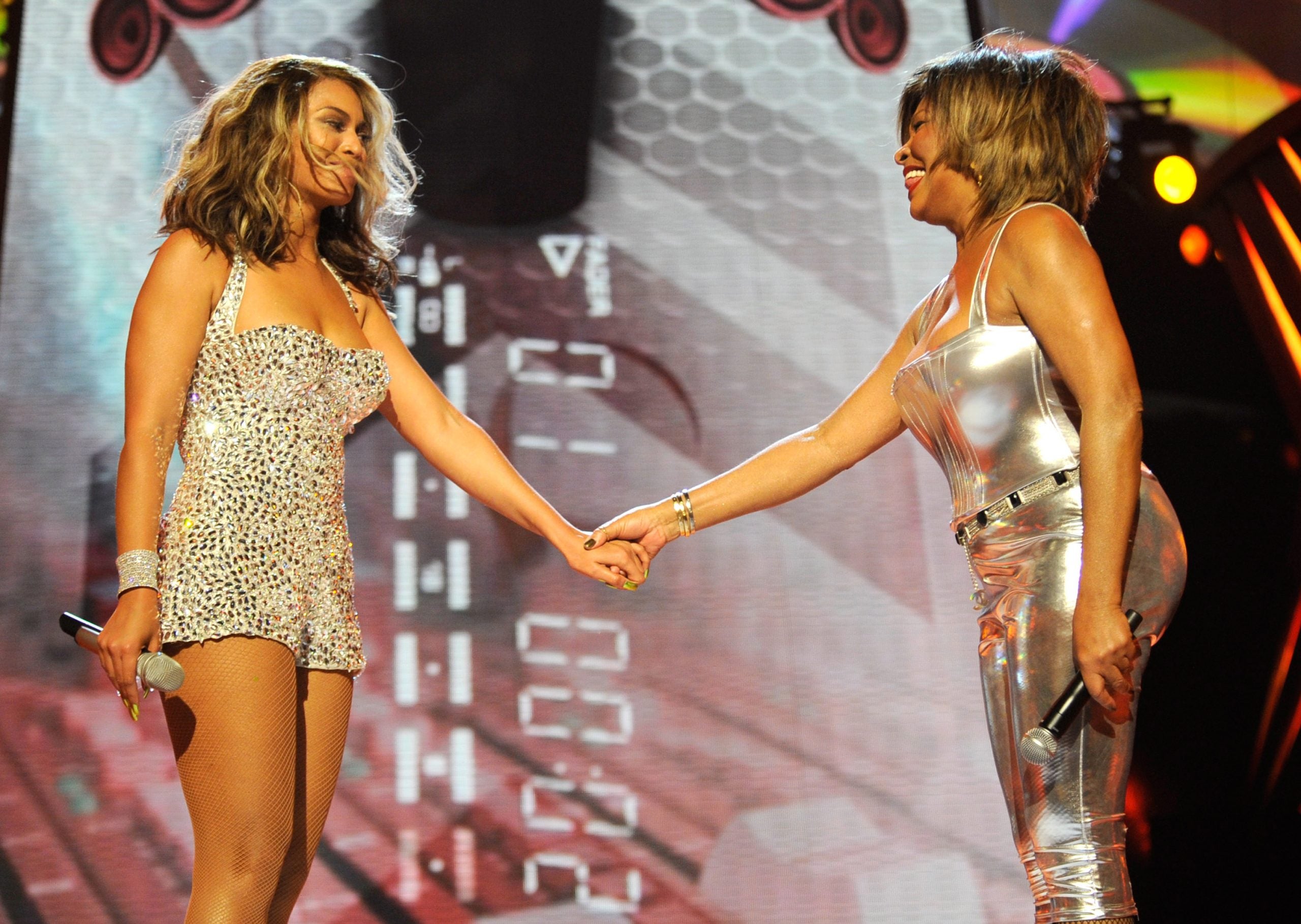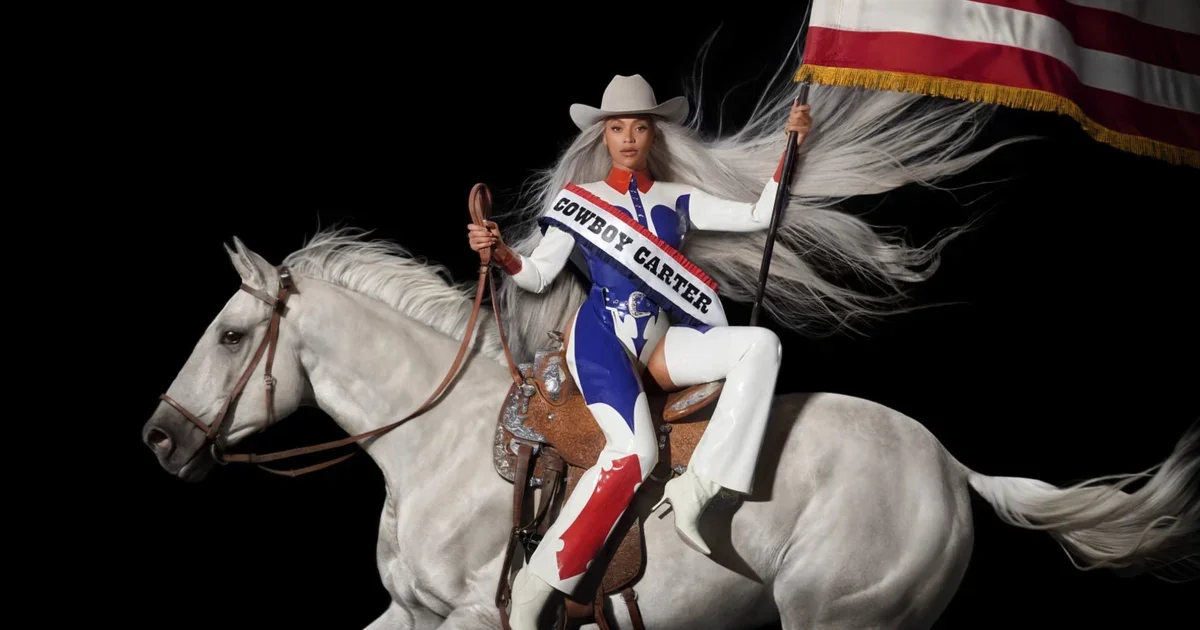
[ad_1]
Family is the blood in the veins of Beyoncé’s music. Dangerously in Love closed with tender thanks to her father, her then-manager, Matthew Knowles. B’Day and 4 spilled over with songs to her loverman. Beyoncé and Lemonade introduced her oldest child, a deluxe version of Self-Titled affirmed her mother. Renaissance was a hand to the heart for her Uncle Johnny. On Cowboy Carter, we get to hear little Rumi on “Protector,” Beyoncé’s sunny vow to watch out for her children; with a flag spear, if need be. “Bodyguard” is a groove made for her guy (and our respective boo-thangs, too.) “Daughter” and the slow-ashing, must-listen, “Jolene,” are more of the same—hearty, spiced meals for her people, and the people, to sop up.
“I treasure every irreplaceable memory.”
Beyoncé, “Daddy,” 2003.
While the Black past (library books, edifices, films, and factually accurate teachings) is challenged by local governments and white exclusionists, and as the costs of rent and home buying reach impossible heights, excavation, even if familial, has become arduous. Concerning ourselves with oral storytelling may be the first step to discovering untold origins. I could learn the stories of my great grandfather’s invisible scars. Or I may finally find out why I only met a certain great aunt once. Smartphones assist us with the task, but only when we pose the right questions and give space for the answers. Black history is not restricted to education on the faces we know well; it is also the more personal characters who make our lives possible.
Beyoncé’s mother, Ms. Celestine “Tina” Knowles, is a Texas miss. From Galveston, to be precise. Her mother and father were from Louisiana. Creole folk with French names—Derouen, Boyancé or Buyincé, depending on the generation. When Celestine was born, a cavalier nurse spelled her last name incorrectly on her birth certificate. “B-e-y-i-n-c-é, ya!,” (as yelped by Cowboy Carter’s yarn-spinner) became “Beyoncé.” To African-Americans, a previously enslaved, still oppressed group who’ve had their identities and liberties stripped, a last name is the mother of dignity. A name is a footprint in hot Louisiana clay saying that I was here and so were the folks I love. When Tina’s mother advocated for the document to be corrected, she was shut down. When Tina gave birth to her first child in 1982, she gave the baby girl the name she was given. That first-born daughter is taking it back.

Cowboy Carter relishes in American music traditions, Beyoncé’s way. The album was conceived before the 2023 death of Tina Turner, one of her musical mothers. You can almost see the late rocker’s heels sweeping the floor to the squalls and steady drum of “Ya Ya.” (I look forward to the pending tour. I’m sure there will be vigorous hair-swinging and heavy cardio, from Houston by way of Nutbush.) Beyoncé had the opportunity to perform for and with the Turner in 2005 and 2008; think of them as christenings for the pop star. Upon receiving iHeartRadio’s 2024 Innovator Award, she thanked Turner, while also mentioning other Black mega-talents who happily stamped her: Michael Jackson, Prince and Stevie Wonder.
Reverence is the stock in which Beyoncé happily stews. Whether it’s reaching back to echo Donna Summer’s most famous steamy song or swinging her hips in the style of Josephine Baker, she holds the hands of those she deems responsible for the bones of her artistry. It creates a lush family tree. Across the album, she passes it forward, sharing the stage with newer Black acts—Tanner Adell, Reyna Roberts, Brittany Spencer, Tiera Kennedy, Shaboozey, and Willie Jones— all of whose careers have been changed by a tap from one of the biggest performers of the past 50 years.
Weaving the up-and-comers with mainstays, she calls on certified hitmakers (and previous collaborators) Nile Rogers, Raphael Saadiq and The Dream, to name a few. They speak each other’s’ language, making a seamless tapestry of pockets that are proven earworms. Lifelong admirer Miley Cyrus joins Beyoncé for “II Most Wanted,” one of the many crowd favorites, while Texan Post Malone comes in for the twangy “Levii’s Jeans.” Super-sexy-sweet Yoncé is a treat that drips down to the floor.
“Country music was theirs, they thought. Or at the very least, not hers.”
Brooklyn White.
There’s intentional inclusion of pioneering, living country performers: Willie Nelson, Dolly Parton, and Linda Martell, the first Black woman to perform at the Grand Ole Opry, have multiple appearances. Nelson and Parton have been household names for decades, while Martell has been more of an obscured gemstone. A student of Black musical foundation, à la Tina, Aretha and Whitney, she got her start shaking lay members with The Spirit. That was all before she transformed into a charting act. Her preaching daddy wished she’d stuck with gospel. “Genres are a funny little concept, aren’t they?,” she says in “Spaghettii.”
Martell released a single album, Color Me Country, in 1970, before being unceremoniously ejected from the industry. Blackballing was to blame.
It ain’t easy being a Black woman. If she were still with us, my auntie would say it like “woe-myn.” There are defined lines you’re supposed to color inside of. Variation can and will result in blowback. Within secular music, Black women make R&B. That’s what they do, they say. When they stretch beyond its bounds, or mix it with another sound, people short circuit. They live to define life in black and white terms. Now, Beyoncé told us this album isn’t country, but one of her own imagination. She prepared us for the spur-spinning and door-busting, but we know her. The real knee-jerks came from hump-haired mee-maws of Facebook and contrarian journalists who couldn’t conceive that she’d paint her own portrait of home. Country music was theirs, they thought. Or at the very least, not hers.
“For legacy, if it’s the last thing that I’ll do/You gone remember me,” she sings on “16 Carriages,” a song I’ve often revisited since I heard it. Remembrance was never optional. Rattlers can’t shake her. They remember “Deja Vu”’s overt sexiness. Her performance slot at the 2016 SuperBowl and the Cowboy Carter-inducing appearance at the Country Music Awards illustrate a dichotomy that continues to play out in the responses to Caitlin Clark versus Angel Reese. One country music radio station’s initial reluctance to play “Texas Hold ‘Em” appeared to have come before the manager had even heard the song. The periods when there’s a “whole lotta talkin’ goin’ on” regenerate Beyoncé. So when she comes back snatching diva cards, commanding bent knees, and thrashing albino alligators, don’t feign shock.

My great-grandmother was born in Frierson, Louisiana. She was Momma or Madear, depending on the speaker, and she liked to bring things together; be it patches or people. When I was a girl, I’d lay in my mother’s bed under a tattered quilt Momma stitched. She died when I was three, a month after the birthday we shared. The cover made me wish I knew her better. I wanted to inquire about her life and have the answers float to me. The quilt’s underbelly read, “Charles Ann Young-White, 1916-1997.” Those aren’t just numbers, they were her everything. Today I asked her daughter, my grandmother, why her name was Charles. She had a grandson named after her, who had a daughter whose name partially pulled from his. Apparently, it didn’t come up in mother-daughter conversations. “Back then, you didn’t question what was,” my grandmother said. These days, we’re questioning what was and what is, and listening carefully to our seamstresses. Beyoncé is a damn good one—and she’s got stories for days.
[ad_2]
Source link







